|

| |
FINAL CONFERENCE
EU Project TRAIN
Professionalization of Literacy and Basic Education: European Trends
Bonn, September 2008
The conference took place in Bonn and was
attended by over 50 participants representing a number of EU members
including Germany, Ireland, Slovenia, Cyprus, France, the Netherlands,
Switzerland, Belgium and Poland.
The key theme of the conference was the professionalization
of literacy and basic education and a number of speakers addressed this
theme throughout the course of the conference.
|
Marijke Dashorst, European
Commission, Directorate-General for Education and Culture |
Keynote
Current European policies and trends concerning
literacy and basic education
Mrs Marijke Dashorst, the National Expert
from the European Commission addressed the conference and in her key
note speech she highlighted the importance of lifelong learning and
projects to improve competences for the 21st century. She encouraged
conference delegates to seek funding available through the European
Commission to conduct research into the literacy and basic education
sectors which would inform policy at European level. |
TRAIN presentation - results,
products and recommendations
Roundtable discussion and plenary session
 |
| TRAIN partnership (from
left): Elie Maroun (ANLCI, France), Helen Murphy (WIT, Irland), Estera
Mozina (SIAE, Slovenia), Bernhard Grämiger (SVEB, Switzerland), Monika
Tröster (DIE, Germany), Klitos Symenonides (CAEA, Cyprus), Chair: Peter
Strijdonk, Director of Vlaams Ondersteuningscentrum voor het
volwassenenonderwijs (VOCVO), Belgium / ERDI board member |
Presentation of basic
modules for literacy and basic education
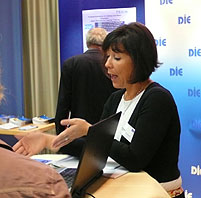 |
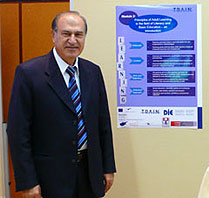 |
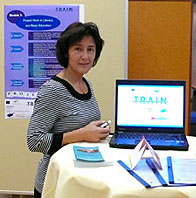 |
MODULE 1: SOCIAL MARKETING
COMMUNICATIONS
Helen Murphy, Waterford Institute of Technology (WIT,
Irland)
|
MODULE 2: PRINCIPLES OF
ADULT LEARNING IN THE FIELD OF LITERACY AND BASIC EDUCATION - AN
INTRODUCTION
Klitos Symenonides,
Cyprus Adult Education Association
(CAEA, Cyprus)
|
MODULE 3: PROJECT WORK IN
LITERACY AND BASIC EDUCATION
Estera Mozina,
Slovenian Institute for Adult
Education (SIAE, Slovenia)
|
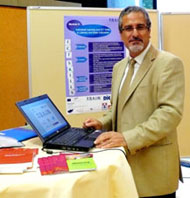 |
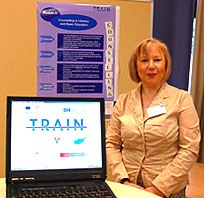 |
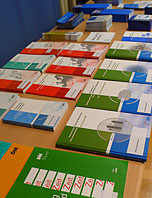 |
MODULE 4: INDIVIDUAL
LEARNING AND ICT SKILLS IN LITERACY AND BASIC EDUCATION
Elie Maroun, National Agency to Fight Illiteracy
(ANLCI, France)
|
MODULE 5: COUNSELLING IN
LITERACY AND BASIC EDUCATION
Monika Tröster, TRAIN project coordinator,
German Institute for Adult Education (DIE, Germany)
|
|

| A number of presentations and
workshops were conducted throughout the conference in which a review of
national reports on state of the art in the field of the professionalization
of literacy practitioners were presented and each TRAIN partner presented
the material (teacher training modules) that had been developed as part of
the TRAIN project.
The workshops also addressed the areas of teacher
competences, policy in relation to adult education, literacy and basic
education and qualifications for practitioners. |
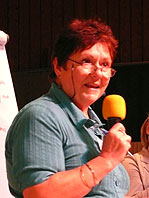 |
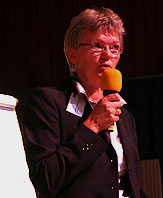 |
Nadia Baragiola, Lire et
Ecrire, Belgium
|
Elisabeth
Fuchs-Brüninghoff, Germany
|
| Literacy experts from Belgium and
Germany who were invited to evaluate the conference and the project
proceedings pointed out that there is a lot of expertise and experiences in
the field of adult literacy in different EU countries to which TRAIN made a
valuable contribution but there are not enough possibilities to exchange and
transfer innovation and examples of good practice among literacy
practitioners. At the end of the
conference delegates summarized the key issues and questions to consider for
the future including:
What does the professionalization of the literacy
practitioner mean?
What qualifications does the literacy practitioner
need?
Finally delegates agreed that there is a need for
national policies and strategy in relation to Literacy and Basic Education
and that this process must be a consultative one involving stakeholders in
all areas in Literacy and Basic Education in each country.
Text: Helen Murphy (WIT/Ireland) |
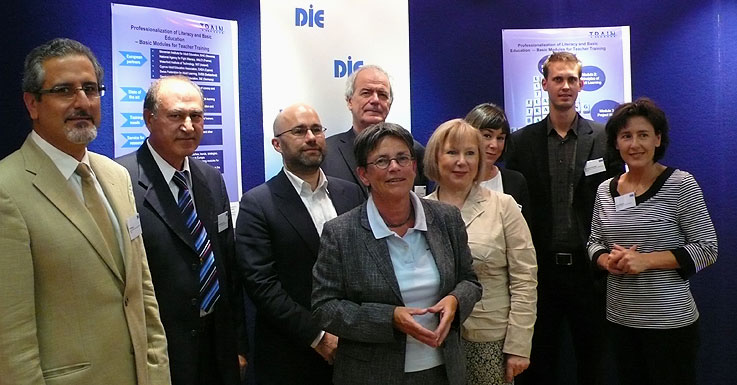 | |
- We would like to invite you
to subscribe our newsletter.
|
<
|
